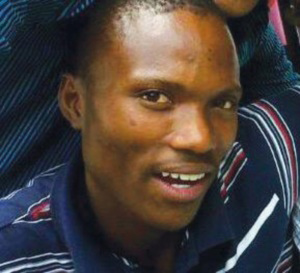|
 |
Thabiso Moholoholo
Photo: Supplied
10 April 2013 |
The whereabouts of University of the Free State (UFS) student Thabiso Moholoholo have been determined. He was found to be in Qwaqwa by the South African Police Service (SAPS) who used cell phone tracking to locate the 'missing' student.
Thabiso 'disappeared' on 9 October 2012 from the Bloemfontein Campus allegedly on his way to the UFS Sasol Library. He was a second-year student doing the BSc Environmental Studies programme, and was a resident in Tswelopele Residence on the Bloemfontein Campus at the time of his disappearance.
The university’s Protection Services, with the assistance of the SAPS, went to great lengths to search for him up until he was found. The investigative work of well-known private investigator Leon Rossouw also assisted greatly in the case.
Shortly after his disappearance a message indicating that he was dead and photos of him lying face-down, covered in what seemed to be blood were posted on his Facebook page. This was followed with a similar SMS message to a friend.
It has now been discovered that Thabiso disappeared on his own initiative and that he made up the violent photos for his Facebook page with the help of a friend.
The senior leadership of the university and residence leadership of Tswelopele are obviously relieved that he was found and thank everyone who worked tirelessly to locate the student.
The university has spent considerable time and extended its limited financial and human resources all in an effort to find this so-called missing student; his conduct is completely unacceptable. The stress on the family, fellow students and the university community as a whole is incalculable.
The university therefore views this staged disappearance in a grave light and considers this act to constitute very serious student misconduct, which could result in disciplinary action and possible expulsion.
Media Release
10 April 2013
Issued by: Lacea Loader
Director: Strategic Communication
Tel: +27(0)51 401 2584
Cell: +27(0)83 645 2454
E-mail: news@ufs.ac.za